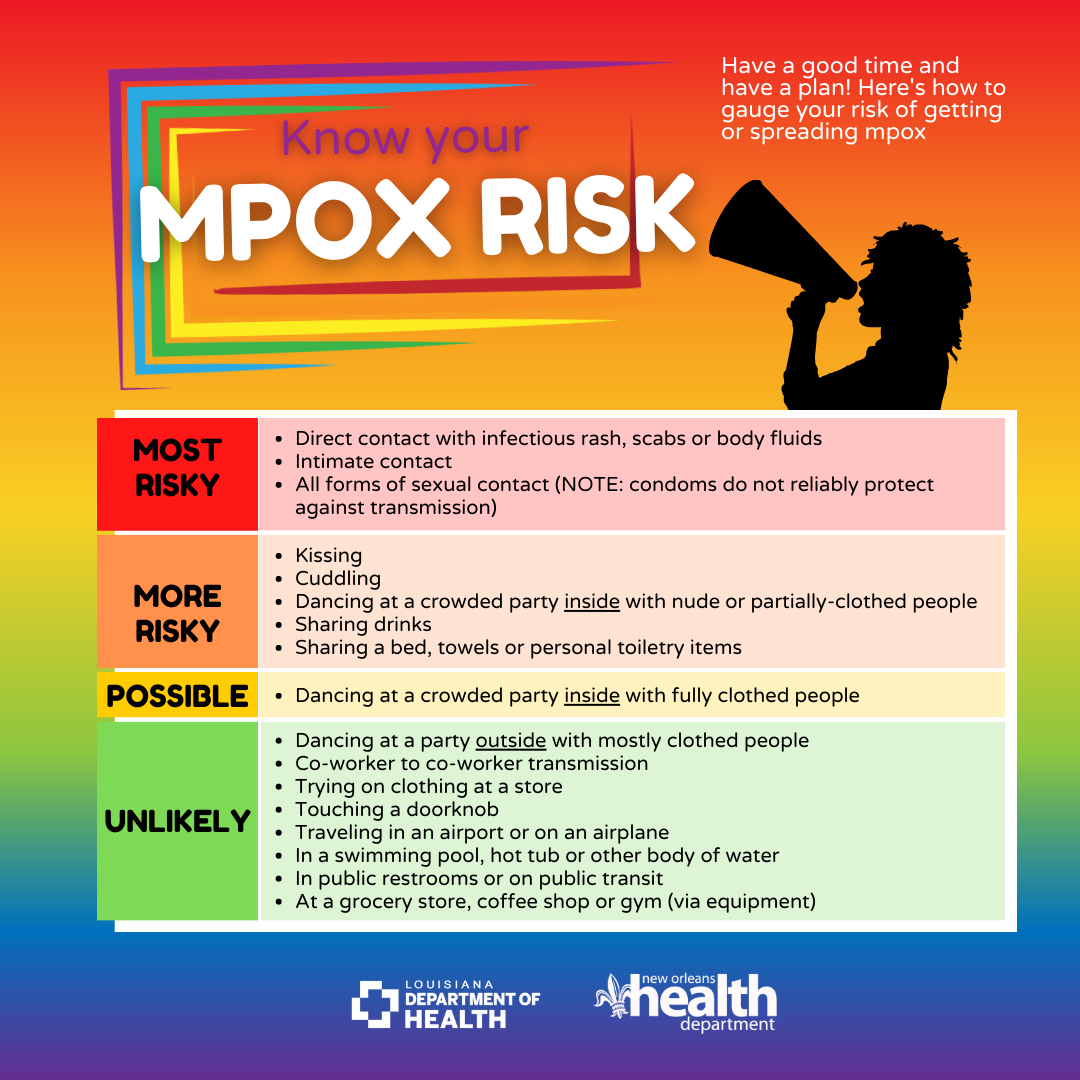Mpox
CDC recommends vaccination against mpox if:
- You had known or suspected exposure to someone with mpox
- You had a sex partner in the past 2 weeks who was diagnosed with mpox
- You are a gay, bisexual, or other man who has sex with men or a transgender, nonbinary, or gender-diverse person who in the past 6 months has had any of the following:
- A new diagnosis of one or more sexually transmitted diseases (e.g., chlamydia, gonorrhea, or syphilis)
- More than one sex partner
- You have had any of the following in the past 6 months:
- Sex at a commercial sex venue (like a sex club or bathhouse)
- Sex related to a large commercial event or in a geographic area (city or county for example) where mpox virus transmission is occurring
- Sex in exchange for money or other items
- You have a sex partner with any of the above risks
- You anticipate experiencing any of the above scenarios
- You have HIV or other causes of immune suppression and have had recent or anticipate future risk of mpox exposure from any of the above scenarios
- You work in settings where you may be exposed to mpox:
- You work with orthopoxviruses in a laboratory
Information about Current US Outbreak
Potential Risk for New Mpox Cases
Mpox Signs & Symptoms
.jpg/?lang=en-US&width=500&height=500)
Mpox spreads in different ways, but is most often spread through direct contact with a rash or sores of someone who has the virus.
It can also spread through contact with clothing, bedding, and other items used by a person with monkeypox or from respiratory droplets that can be passed through prolonged face-to-face contact, including kissing, cuddling, or sex.
People who do not have mpox symptoms cannot spread the virus to others.
Anyone who has been in close contact with someone who has mpox is at risk.
What should individuals with concerns do?
Know your risk for getting mpox. Use the graphic below to find out how your activities may put you at risk.

Anyone can take basic steps to prevent the spread of mpox. Anyone concerned about being exposed or infected should refrain from intimate or close personal contact and seek medical advice. If you do not have a healthcare provider, you can visit a parish health unit near you. Locate a parish health unit in your area at ldh.la.gov/phu
What do I do if I have symptoms?
Contact your healthcare provider immediately and avoid sex or other close, intimate contact until you have been checked out.
Testing for mpox is available through reference laboratories in addition to the state public laboratory. Contact your healthcare provider if you have symptoms and want to be tested for mpox. Anyone without a provider or insurance can also be tested at their local parish health unit or community clinic: ldh.la.gov/phu
Avoid gatherings, especially if they involve close, personal, skin-to-skin contact or prolonged face-to-face contact.
Talk to your partners about any recent illness, and be aware of new or unexplained sores or rashes on your body or your partner’s body, including rashes on the genitals and anus.
People with new rashes should also be aware that the rate of syphilis is rising in Louisiana and nationally.
If your test for mpox is positive, stay isolated until your rash has healed, all scabs have fallen off, and a fresh layer of intact skin has formed.
Is there a mpox vaccine?
Yes. JYNNEOS is the name of the FDA-approved mpox vaccine - it is two doses administered 28 days apart, and full protection begins two weeks after the second shot. The mpox vaccine is FDA approved.
CDC recommends vaccination against mpox if:
- You had known or suspected exposure to someone with mpox
- You had a sex partner in the past 2 weeks who was diagnosed with mpox
- You are a gay, bisexual, or other man who has sex with men or a transgender, nonbinary, or gender-diverse person who in the past 6 months has had any of the following:
- A new diagnosis of one or more sexually transmitted diseases (e.g., chlamydia, gonorrhea, or syphilis)
- More than one sex partner
- You have had any of the following in the past 6 months:
- Sex at a commercial sex venue (like a sex club or bathhouse)
- Sex related to a large commercial event or in a geographic area (city or county for example) where mpox virus transmission is occurring
- Sex in exchange for money or other items
- You have a sex partner with any of the above risks
- You anticipate experiencing any of the above scenarios
- You are living with HIV or other causes of immune suppression and have had recent or anticipate future risk of mpox exposure from any of the above scenarios
- You work in settings where you may be exposed to mpox:
- You work with orthopoxviruses in a laboratory
Need more information about mpox?
Louisiana Department of Health
Centers for Disease Control and Prevention